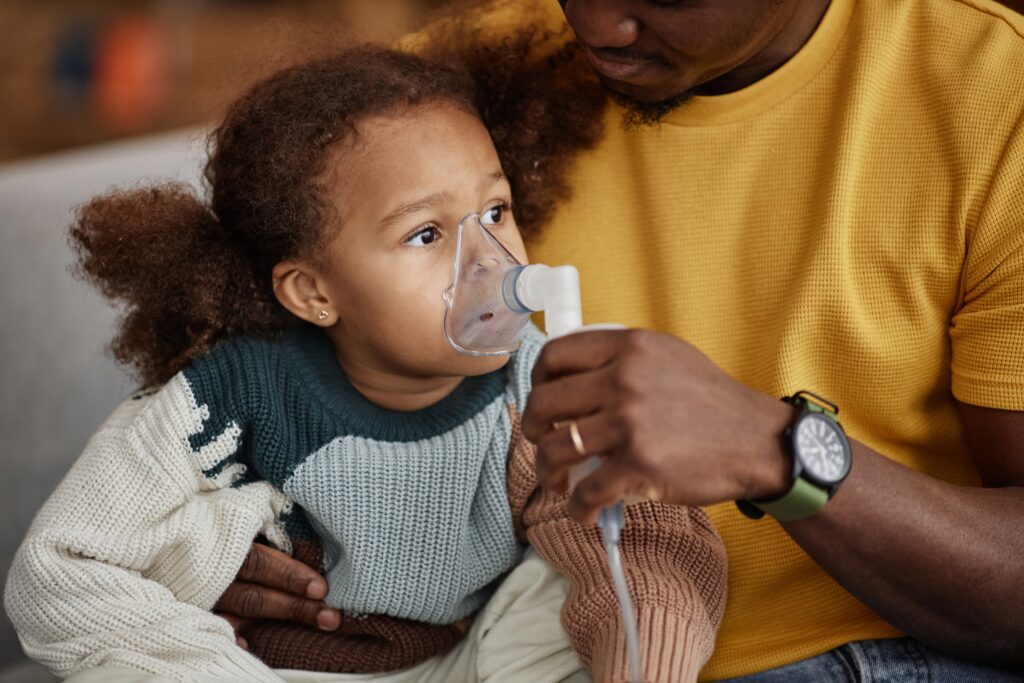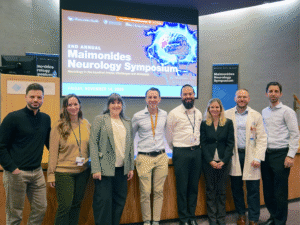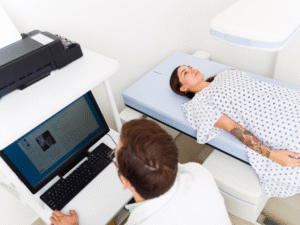At Maimonides’ Division of Pediatric Pulmonary Medicine, our specialists offer diagnosis, treatment, and support services for a wide range of pediatric lung and respiratory conditions. Operating as a combined service with Maimonides’ Pediatric Allergy and Immunology, our pediatric experts take a collaborative approach, not only focusing on chronic lung and respiratory diseases, but the full spectrum of immune, allergy, and lung problems.
Sophia Pillai, MD, recently joined Maimonides Children’s Hospital’s Pediatric Pulmonology team, bringing her rich background and 20 years of experience caring for complex respiratory and aerodigestive issues to families in Brooklyn. She joins specialists Michael Marcus, MD, Director of Pediatric Pulmonary Medicine and Allergy/Immunology; Joshua Needleman, MD, Section Chief, Pediatric Pulmonology; and Linda Chen, DO, Pediatric Pulmonologist.
Most recently, Dr. Pillai practiced at the Mayo Clinic in Rochester, Minnesota, providing patient care and leadership within the institution’s multidisciplinary aerodigestive services. At Maimonides, she leads efforts to shape the two newest additions to Pediatric Pulmonary Medicine services: an aerodigestive medicine program, and the Neonatal Lung Health Program. Both programs emphasize a comprehensive, multidisciplinary approach to pediatric respiratory diseases to enhance quality of life for patients and families affected by these conditions.
“As a pediatric pulmonologist, I dedicate my work to improving the lives of children with chronic respiratory and particularly aerodigestive conditions,” said Dr. Pillai. “I’ve seen firsthand how fragmented care between specialties and institutions delays diagnoses, prolongs symptoms, and places a huge burden on families with young children. These challenges really fuel my commitment to creating a robust multidisciplinary aerodigestive program accessible to more children and families.”
First-in-Brooklyn Aerodigestive Program
Pediatric aerodigestive disorders encompass problems in children that affect breathing, feeding, and swallowing; issues can originate in one or more structures including the throat, esophagus, trachea, lungs, bronchi, or stomach¹. The complex ways in which feeding and swallowing problems can interact with or exacerbate breathing problems, or vice versa, necessitates the coordination of multiple specialists in order to provide a complete understanding of each child’s unique condition.
“In the past, you would have to send each patient to two or three separate doctors — a pulmonologist, a gastroenterologist, and an ear, nose, and throat surgeon to get the complete picture,” said Dr. Marcus.
The new aerodigestive program enables families to receive comprehensive care in a single location, not only from these specialties, but also from Maimonides’ extensive supportive health services like speech-language pathology, occupational therapy, and physical therapy, among others. This robust multidisciplinary approach allows clinicians to carry out coordinated procedures, review diagnostic findings jointly, and provide unified recommendations to families, to simplify and improve health outcomes. For children whose aerodigestive conditions pose significant challenges to their overall health, these comprehensive clinical decisions and simplification of knowledge and care for families build stronger foundations for improved aerodigestive health over time.
“While it might appear simple, many families are facing these complex chronic health conditions, and with so many factors affecting a child’s total health, keeping track of the recommendations of multiple doctors — sometimes from multiple institutions — can make it even more confusing,” said Dr. Pillai. “I’ve seen firsthand how the kind of unified, patient-centered approach we’re creating here really restores confidence for caregivers navigating this complex care.”
Neonatal Lung Health Program Introduces Preventive Approach Post-NICU
In addition to the aerodigestive program, Dr. Pillai is leading Maimonides’ new Neonatal Lung Health Program, marking an expansion into focused care for the long-term respiratory health of infants born prematurely. As a New York State-designated Regional Perinatal Center (RPC), Maimonides Neonatal Intensive Care Unit (NICU) provides exceptional care for a high volume of high-risk deliveries and critical care for newborns 24 hours a day, 7 days week.
One in 10 babies in New York state are born before 37 weeks gestation². While many of these infants may appear healthy at the time of discharge, a growing population of late preterm infants experience respiratory complications related to preterm birth later in life³.
The new program introduces a novel proactive approach to long-term monitoring of lung health following NICU discharge, for babies born at Maimonides and elsewhere. While many programs focus on infants with a confirmed bronchopulmonary dysplasia diagnosis, our program is unique in targeting the broader, often overlooked population of preterm infants without formal bronchopulmonary dysplasia diagnosis who remain at high risk for ongoing respiratory issues.
“As we launch this program, we are building it around a preventative, longitudinal care approach,” said Dr. Pillai. “Many pediatricians are unaware of the growing body of research linking late preterm births with chronic respiratory conditions such as asthma and recurrent respiratory infections. The standard approach tends to address these respiratory events in isolation. What sets our program apart is its emphasis on early identification and intervention by monitoring at-risk infants over time, with the primary goal of preventing future complications and actively supporting lung growth and long-term respiratory health.”
Supporting Long-Term Respiratory Health in Partnership with Primary Care Providers
These new pediatric pulmonary programs extend care to infants and children with respiratory disorders ranging from mild to severe. The expansion of services is especially groundbreaking for those born in late preterm, a population Dr. Pillai refers to as growing, but overlooked.
“The first few years of life, usually up to age 5, are vital to establishing lung health and avoiding development of conditions like COPD and asthma. A major issue, especially here in New York City, is the tendency for these patients to bounce between disconnected health systems, so that by the time complications set in, we have actually missed that opportunity to intervene,” she said. “Creating equitable access to this kind of high-quality care for families is incredibly important to me, and it’s central to my vision of seamless services for kids with chronic respiratory and aerodigestive feeding conditions, bringing them stability, relief, and a better quality of life.”
“Our division has long provided comprehensive care for a diverse range of respiratory issues, including asthma, sleep-related issues, complex lung problems, whether congenital or acquired, infections, and conditions requiring supportive respiration,” said Dr. Marcus. “With Dr. Pillai’s extensive experience in managing longitudinal care plans for patients with chronic lung conditions, we’re proud to bring these novel, comprehensive approaches to aerodigestive and neonatal lung health care directly to patients in Brooklyn, where they didn’t exist in a centralized way before.”
In both programs, Maimonides specialists will work in tandem with each patient’s primary care pediatrician to recommend and carry out optimal long-term care, with medical, surgical, and noninvasive options to prevent adverse events and progression of lung disease, and promote lung health. Referrals are recommended for patients with mild to severe respiratory symptoms who were born at less than 37 weeks.
For more information, visit the Division of Pediatric Pulmonary Medicine webpage. To refer a patient or make an appointment, call (718) 283-7500.




